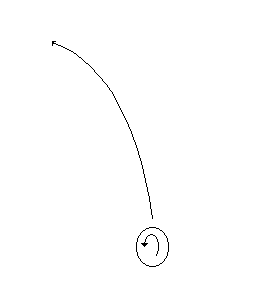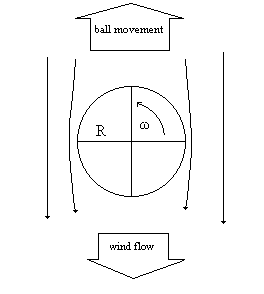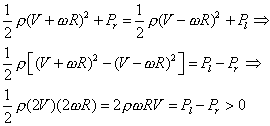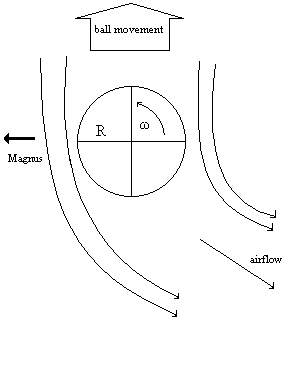PHYSICS
THE MAGNUS FORCE A POPULAR MISCONCEPTION
Football funs know that when you take a free kick, if you want the ball to have a curvy trajectory to the left you must kick it with the right foot on the right side so that the ball spins counterclockwise.
European funs will remember Effenbergs goal in the Champions League against Dynamo Kiev in the semifinal much in Kiev the year Manchester United won the cup. So how does the ball take that trajectory? It is generally thought that this effect is due to Bernoulli's principal that
is Although there is nothing wrong with this reasoning, it doesn't explain the direction that the ball follows. In fact it gives results that contradict the observed trajectory. So lets see what is the predicted trajectory of the Bernoulli's principal.
The ball moves with a velocity V. We can consider that the ball is stationary and that the air flows with a velocity V. The ball rotates with angular velocity ω and has radius R. So we approximately have from Bernoulli's principal:
were
From the last equation we can see that the pressure on the left side is grater than the pressure on the right side, so the ball should move to the right under the pressure gradient. But as we know from our football experience this doesn't happen. So why does the ball go to the left? When the ball is rotating the airflow after the ball is diverted to the left or to the right according to the rotation of the ball. If the ball rotates counterclockwise (as it is in our case) then the airflow is diverted to the right of the ball. So from the conservation of momentum the ball should move to the left due to the force the wind applies to the ball. This is the same principal that we have in rockets were the exhaust gasses propel the rocket. Why does the airflow divert? When air flows over a surface it creates a boundary layer, were the air follows the movement of the surface. At high air speeds the boundary layer is detached from the surface. In the case of the spinning ball the air speed is higher on the right side of the ball so the boundary layer separates from the surface earlier than it does on the left side. That is why the airflow is diverted to the right.
There is an article in Scientific American on the subject. |
| Sign
My Guestbook |
Join Artemis Society International

This page is hosted by

 and states that in an incompressible fluid the sum
of the dynamic and static pressure is constant. How does this apply? As the ball moves through the
air we can consider that there is airflow on the right and on the left side of the ball. Since the
ball is rotating its surface on the right moves in the opposite direction of the airflow and its
surface on the left moves in the same direction with the airflow. So the relative velocity of the
air to the surface is different in the right and in the left side. This results to a pressure
difference on the two sides of the ball and therefor a force is applied on the ball that causes
the curved trajectory.
and states that in an incompressible fluid the sum
of the dynamic and static pressure is constant. How does this apply? As the ball moves through the
air we can consider that there is airflow on the right and on the left side of the ball. Since the
ball is rotating its surface on the right moves in the opposite direction of the airflow and its
surface on the left moves in the same direction with the airflow. So the relative velocity of the
air to the surface is different in the right and in the left side. This results to a pressure
difference on the two sides of the ball and therefor a force is applied on the ball that causes
the curved trajectory. 

 is the relative velocity of
the air to the surface on the right and the left side. From these equations we have:
is the relative velocity of
the air to the surface on the right and the left side. From these equations we have:
